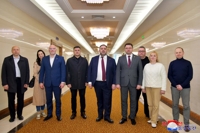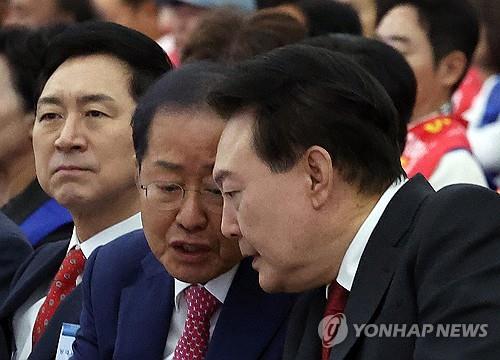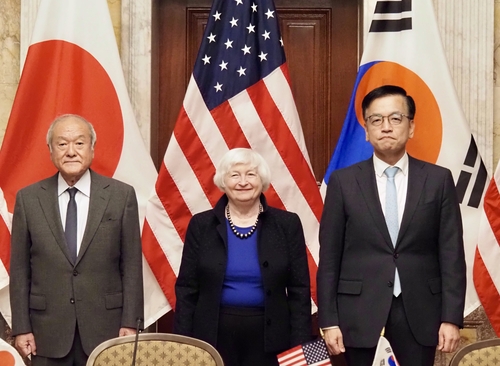(LEAD) S. Korea mulls making cross-border money transfers easier
(ATTN: RECASTS headline, lead; UPDATES changes in paras 2-4, 10-12, 14-15)
SEJONG, May 24 (Yonhap) -- South Korea is considering a measure to make it easier for people to transfer money across borders without going through banks, government sources said Sunday.
The move could allow securities firms, insurers and most importantly FinTech companies to handle transfers that can help lower fees and benefit ordinary consumers. At present, only banks are allowed to deal with money transfers.
The expansion of money transfer services, which is part of the broader policy goals outlined by the finance ministry earlier this year, could scale back the often complicated process of sending and receiving money, a finance ministry source said.
"The goal is to create a new money transfer business, separate from banks that have monopolized this sector, by issuing licenses to those that have the means to handle the business," the ministry insider said.
It said the proposed change represents a "negative form" of restrictions that allows private sector considerable freedom, with state regulators only intervening to prevent problems.
If FinTech companies enter this business, messenger services like KakaoTalk and Line Corp. can get people to download special apps so money transfers can be made using various mobile devices at home and at work, the ministry added.
FinTech, or financial technology, is an emerging business that makes use of software to facilitate financial services. In the past, critics said that the government's restrictions have held back growth of this sector, even though South Korea's information technology industry is rated as being top class.
Such a move will permit South Korea to keep abreast of latest developments taking abroad where services like TransferWise and CurrencyFair are already doing businesses in the people-to-people realm.
Industry insiders said that the area where financial deregulation will be most beneficial is the 1.52 million foreigners living in the country and 220,000 South Korean students studying abroad who rely regularly on money transfers.
"At present, a person sending or receiving 1 million won will pay 50,000 won in various fees, because the money has to go through at least three different institutions and takes upwards of three days," a financial watcher said.
He said local FinTech companies may be able to slash fees by a tenth and that liberalization will force banks to take similar measures to hold onto customers.
Government officials, however, made clear that any deregulation will cover relatively small sums of money, with companies required to go through existing channels. It said the government will likely take steps to keep close tabs on all transactions to ferret out people that abuse the lifting of restrictions.
"The exact amount of money that could be transferred through new means have to be decided," an official said. "Various government agencies are discussing the matter in detail."
Besides this, policymakers are considering an option that can allow electronic payment gateway firms to handle foreign transactions. This move, if implemented, can make it possible for Chinese nationals to use their Alipay to buy products online from South Korea.
Related laws allowing more money transfer freedom is expected to be sent to parliament for approval in June, although the exact timetable can change depending on political developments.
yonngong@yna.co.kr
(END)
-
 Defense chief says N. Korea's hypersonic missile 'unsuccessful' in last-stage glide flight
Defense chief says N. Korea's hypersonic missile 'unsuccessful' in last-stage glide flight -
 Relax, immerse yourself in scents at Venice Biennale's Korean Pavilion
Relax, immerse yourself in scents at Venice Biennale's Korean Pavilion -
 Overdue debut of Korean abstract art pioneer Yoo Young-kuk at Venice Biennale
Overdue debut of Korean abstract art pioneer Yoo Young-kuk at Venice Biennale -
 N. Korea has capability to genetically engineer biological military products: U.S. report
N. Korea has capability to genetically engineer biological military products: U.S. report -
 PPP lawmaker says entire Cabinet should resign over general elections defeat
PPP lawmaker says entire Cabinet should resign over general elections defeat
-
 Relax, immerse yourself in scents at Venice Biennale's Korean Pavilion
Relax, immerse yourself in scents at Venice Biennale's Korean Pavilion -
 Overdue debut of Korean abstract art pioneer Yoo Young-kuk at Venice Biennale
Overdue debut of Korean abstract art pioneer Yoo Young-kuk at Venice Biennale -
 Defense chief says N. Korea's hypersonic missile 'unsuccessful' in last-stage glide flight
Defense chief says N. Korea's hypersonic missile 'unsuccessful' in last-stage glide flight -
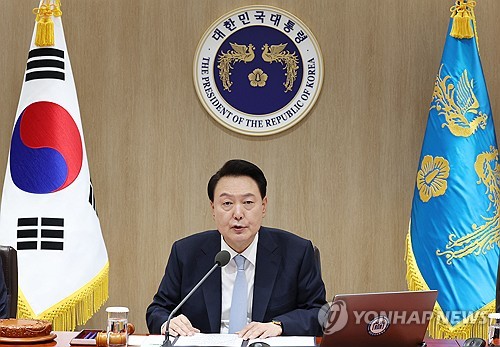 (LEAD) Yoon vows to improve communication with people after election defeat
(LEAD) Yoon vows to improve communication with people after election defeat -
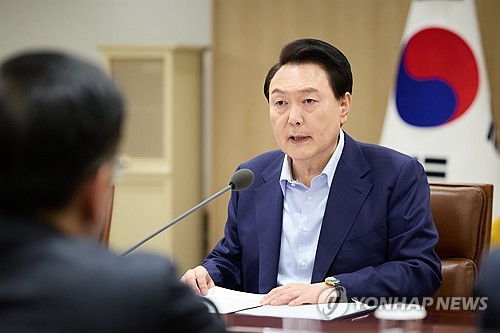 Yoon presides over emergency meeting on Mideast crisis
Yoon presides over emergency meeting on Mideast crisis
-
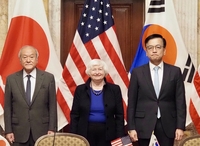 (4th LD) Finance chiefs of S. Korea, U.S., Japan recognize 'serious' concerns over 'sharp' won, yen depreciation
(4th LD) Finance chiefs of S. Korea, U.S., Japan recognize 'serious' concerns over 'sharp' won, yen depreciation -
 S. Korea to provide 100,000 tons of rice to 11 nations
S. Korea to provide 100,000 tons of rice to 11 nations -
 Yoon, Daegu mayor met to discuss post-election matters: sources
Yoon, Daegu mayor met to discuss post-election matters: sources -
 Facebook page unveils photos of BTS member V in counter-terrorism unit gear
Facebook page unveils photos of BTS member V in counter-terrorism unit gear -
 S. Korea to provide US$200 million in humanitarian aid to Ukraine this year
S. Korea to provide US$200 million in humanitarian aid to Ukraine this year


















